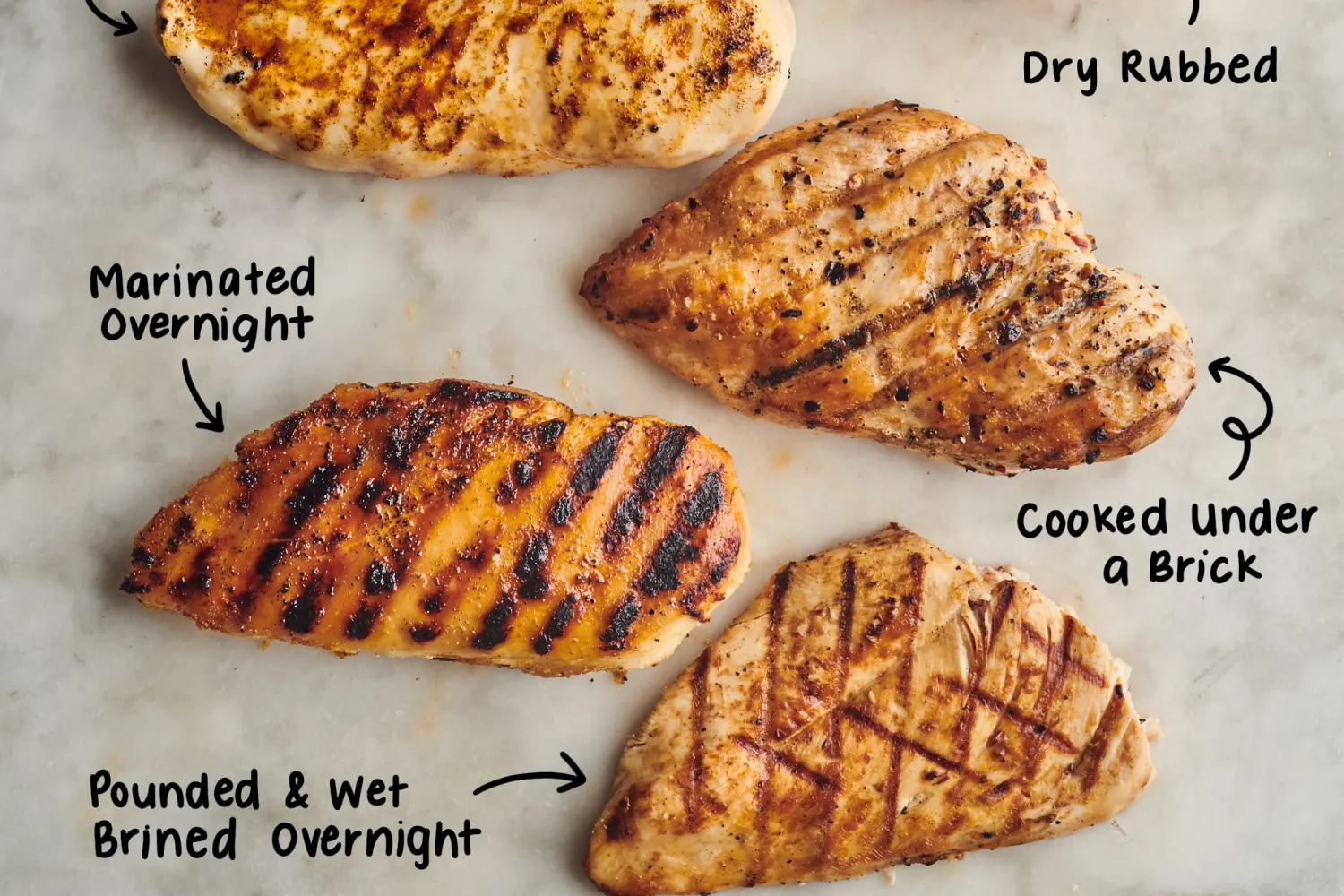Grilling chicken breast can be tricky. Without proper preparation, it can easily dry out and turn rubbery on the grill. However, with a simple brining technique, you can ensure tender, juicy, and flavorful grilled chicken breast every time. In this article, I’ll explain what brining is, why it works so well for chicken breast, and provide a step-by-step guide to brining chicken for the grill.
What is Brining and How Does it Work?
Brining is the process of soaking meat or poultry in a saltwater solution (aka a brine) before cooking. The brine is typically made by dissolving salt in water, along with some aromatic additions like spices, herbs, and sugar.
When the raw meat is submerged in the brine, a couple of things happen:
- The salt in the brine begins to break down muscle proteins on the surface of the meat, allowing the brine to penetrate deeper into the meat. This helps the meat retain more moisture during cooking.
- The meat absorbs some of the salty brine, seasoning it from the inside out.
- Sugars and spices in the brine impart additional flavor.
The end result is chicken that is seasoned throughout, incredibly moist and juicy, and much harder to overcook. It’s basically chicken breast upgraded!
Brining does wonders for lean meats like chicken breast that are prone to drying out, especially high-heat cooking methods like grilling. The added moisture protects the meat and prevents it from seizing up and toughening.
How Long Should You Brine Chicken Breast?
You don’t need to brine chicken breasts for very long to get the benefits. For bone-in chicken breasts, a brine time of 1-2 hours is sufficient. For boneless, skinless breasts, cut down the time to 30 minutes up to 1 hour.
Any longer than that, and the chicken can become too salty. With boneless breasts in particular, 30 minutes gives you nicely seasoned and juicy meat without going overboard on saltiness.
How to Make a Simple Brine for Chicken
Here is an easy brine formula for a quart of water:
- 1/4 cup kosher salt
- 2 tablespoons sugar
- Other seasoning additions like garlic, pepper, herbs (optional)
Kosher salt is recommended because the large grains dissolve easily in water. Table salt with smaller grains can make the brine overly salty.
For food safety, it’s important to use cool water for brining raw chicken. Warm water can put the chicken in the danger zone for bacterial growth.
Step-by-Step Instructions for Brining Chicken Breast
- Make the brine. In a 2-quart container, stir together 4 cups cool water, 1/4 cup kosher salt, and 2 tbsp sugar until the salt and sugar dissolve. Add any other seasoning ingredients you like.
- Add the chicken. Place 1-2 lbs of bone-in or boneless chicken breasts in the brine. Cover and refrigerate for 30-60 minutes.
- Remove chicken from brine. Discard leftover brine. Rinse chicken breasts under cool water and pat dry with paper towels.
- Apply a seasoning rub. Coat the chicken all over with olive oil and sprinkle with your favorite seasoning rub.
- Grill the chicken. Grill over direct medium-high heat for 4-6 minutes per side, until chicken registers 160°F at thickest part.
- Rest and serve. Allow chicken to rest 5 minutes before slicing and serving.
And that’s it – easy peasy brined chicken ready for the grill! The brine keeps the breast meat tender and juicy, while the rub adds great charred flavor.
Grilling Tips for Brined Chicken Breasts
- Use a digital instant-read thermometer to test doneness. Chicken is safe to eat at 165°F, but taking it off the grill around 160°F prevents overcooking.
- Avoid flare-ups. If you notice flaming on the grill, move chicken to a cooler area. Charring is good, burning is not.
- Grill skin-side down first. If using bone-in chicken breasts with skin, place them skin-side down on direct heat to crisp up the skin, then finish cooking flesh-side down on indirect heat.
- Cut breasts in half horizontally if very thick. Halving thicker chicken breasts helps them cook evenly.
- Let rest before serving. Allowing the chicken to rest 5-10 minutes after grilling prevents juices from running out when you cut into it.
Delicious Ways to Use Brined Grilled Chicken
Brined grilled chicken breast is so flavorful and juicy, it can be used in all kinds of delicious ways:
- Chopped into salads – try a grilled chicken Caesar or Cobb salad.
- Sliced for sandwiches and wraps – chicken gyro, grilled chicken BLT, buffalo chicken wrap.
- Diced and mixed with barbecue sauce, salsa, or buffalo sauce for appetizers.
- Added to pasta, rice bowls, fajitas, tacos, flatbreads, and pizza.
- Sautéed with vegetables and seasoning for easy weeknight dinners.
So don’t be afraid to fire up the grill and cook chicken breast this summer. With the simple step of brining, you’ll have tasty, foolproof chicken ready in about an hour from start to finish. Give it a try and let me know how it turns out!
How to Brine Chicken Breasts
FAQ
Should you brine chicken breasts before grilling?
What is the formula for brining chicken?
Do I rinse chicken after brining?
How long should I brine chicken breast?

